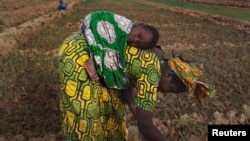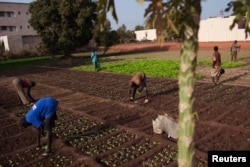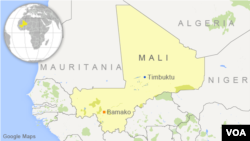Wearing a long white tunic covered with bright-colored patterns, Aminata Berthe bends to water a plot of lettuce with a can in this village near Bamako, the Malian capital.
"I'm the first one in my home to wake up and the last to go to bed," she said, pausing to catch her breath. She has been farming the land for three years as part of a women's vegetable cooperative, but doesn't have the right to own it.
"The land we're farming belongs to the husband of one of the cooperative members," she explained.
In Malian society, men hold primary rights of access to and control over land and decide which parts, if any, women are allowed to farm.
But worsening climate conditions such as unpredictable rainfall and prolonged drought have increased competition for land, leading men to encroach on land traditionally farmed by women.
Change is afoot, however. The government this year could pass a new law that would set aside a share of government-managed land for women to farm, said Siriman Sakho, a rural development specialist who works with a group of Malian farmers' representatives.
Discussions about the proposed law have included farmers’ groups, particularly the National Federation of Rural Women in Mali, he said.
"The government is in a drive to fit up farming land throughout the country," Sakho said. "Under the new law, the authorities would give women exclusive access to 10 percent of government-managed land, at a cost of 65,000 CFA francs [$105] per year."
Each woman who accessed land would pay the annual fee, he said.
Meanwhile, "the rest of government land will continue to be farmed by women and men alike," he said.
Under the Malian Family Code, women are required to obey their husbands, who are considered head of the household. "This means women can lose the land they are farming on if their husband, brother or father decides to sell the family's farm," said Sakho.
Economic autonomy
The proposed law is a welcome development, said Bakary Togola, the head of a farmer group that supports the draft.
"As climate is changing, agriculture needs to change too," he said. "How can we improve our yields when most farmers — women — don't have the right to own land?"
Oumou Bah, the minister for the Promotion of Women, Children and Families, agrees. She said at an event in Bamako in December that giving women access to land would improve not just their living conditions, but the economy.
"Women account for 70 percent of food production in the country," she said. "That's a huge part of the labor force, and yet they lack economic autonomy, particularly in rural areas."
Bah believes that improving women's access to land is key to strengthening food security in the country.
"Improving women's access to land will allow them to produce a greater variety of crops like okra and tomatoes, in addition to staple crops which they typically produce on their husbands' land — like cereal," Bah said.
The wider variety of crops could diversify diets and help tackle malnutrition, a significant problem in the country's rural areas, Bah added.
Malnutrition is the leading cause of infant mortality, according to the health ministry.
Learning from experience
The new law won't do much to change how families manage their own land, however, said Ousmane Toure, a sociologist living in Bamako.
In 2009, a proposed reform to the Family Code to change provisions regarding inheritance and age at marriage, among other things, was opposed by Islamic groups and ultimately passed without any improvement to women's rights, Toure said.
"If the law again tries to touch family land, it is doomed to fail," he warned.
He believes the best way to preempt opposition and allow women to control land is to apply the reform to government-managed land only.
Sakho says the new law — adopted by the Cabinet in 2015 and expected to pass in the National Assembly in 2017 — is likely to succeed, as religious groups have no control over public land.
And "the daily presence of government representatives monitoring the land will dissuade men from encroaching on it," he suggested.
In the meantime, Berthe and the women hope to carry on farming for as long as they can. "We may have to abandon the land if the landlord decides to sell it," she said.







